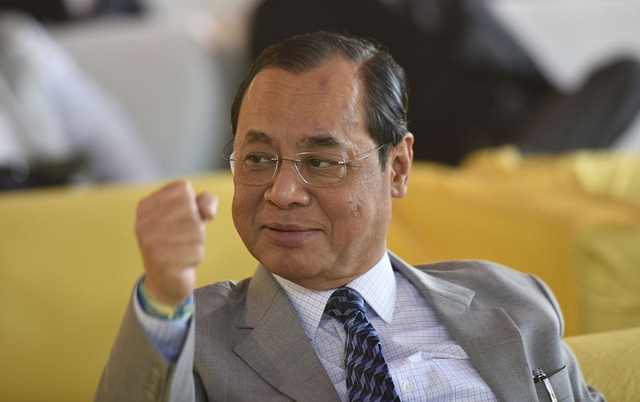
CJI Gogoi Gets Off To The Right Start By Restricting High-Profile Lawyers From Seeking Early Hearings
CJI Gogoi’s decision to cut down on mentioning is one bid to curtail the seeking of special favours by high-priced lawyers.
It strikes a blow for equality before the law.
The new Chief Justice of India (CJI), Ranjan Gogoi, got off to a good start in his 13-month tenure when he took the bold decision to stop entertaining any mentioning of special pleas for early hearings except in specific cases like hangings or eviction from homes.
“No more mentioning from today. We will entertain mentioning of only those petitions where a person is getting hanged, or is being evicted from home,” The Times of India quotes him as saying after his swearing-in yesterday (3 October), abandoning a system that has been in vogue for years. “Mentioning” refers to the practice of queues of lawyers muscling into the CJI’s presence to request early hearings in their pet cases.
One can quibble with even these exceptions (convicts facing death sentences get several chances for a reprieve, and so waking up the CJI or the court in the wee hours just before a hanging is hardly necessary unless there is dramatic new evidence), but one has to applaud the principle he has upheld indirectly. The more one panders to “mentions”, the more the court is likely to stray from its core function of being equally accessible to all Indians. It is no secret that only high-profile senior counsel tend to get heard in mentions, and to the extent they get to move ahead in the queue, it is a distortion of the principle of equality before the law.
In India’s compromised legal ecosystem, favoured lawyers can barge into the CJI’s courtroom and demand that a Teesta Setalvad’s bail application be heard immediately, or – as Prashant Bhushan tried to do even after CJI Gogoi laid down the law on mentions – that the illegal Rohingya immigrants who are to be deported be given a quick hearing.
High profile senior counsel like Kapil Sibal, Prashant Bhushan, or Indira Jaising, and others of a similar stature, tend to get priority treatment by various benches, whether it is in scheduling an immediate hearing, or in obtaining stay orders for their favoured clients. In the process, it is difficult to believe that justice is blind to the weight of your calling card or the size of your wallet.
Some lawyers who get as much as Rs 1 crore as daily fees cannot be earning this kind of moolah merely for doing their job. No bit of advice is worth this kind of money, unless this money involves doing other things to influence the judicial process, including expediting or delaying some hearings and cases.
In an interview to The Economic Times earlier this year, Justice J Chelameswar, who took on the earlier CJI on grounds of alleged bench-fixing, hinted that senior lawyers were not particularly concerned about judicial corruption. This is what Swarajya wrote at that time, using quotes from the interview.
“Justice Chelameswar was asked about the state of judicial corruption. His reply: ‘Justice (JS) Verma made a statement, Justice (PS) Bharucha (both former CJIs) made a statement, but did anything happen in this country? None of these Rs 1 crore-per-day lawyers spoke up. They have appeared before all the judges whom they condemned subsequently. So, what's the point talking about it?”
“Was Justice Chelameswar hinting that corruption suits these Rs 1 crore lawyers?
“In reply to another question, on whether the judiciary should have a selection-cum-interview process for appointing judges, he said: ‘I am all for a system where judges to constitutional courts are subjected to scrutiny by a public body. But how many people will agree for this? You ask these Rs 1 crore lawyers, whether they will agree for that.’
“This second reference to Rs 1 crore lawyers tells us that the judge does not think highly of high-cost senior counsel, who wield so much power in the corridors of the Supreme Court.”
CJI Gogoi’s decision to cut down on mentioning is one bid to curtail the seeking of special favours by high-priced lawyers. It strikes a blow for equality before the law.